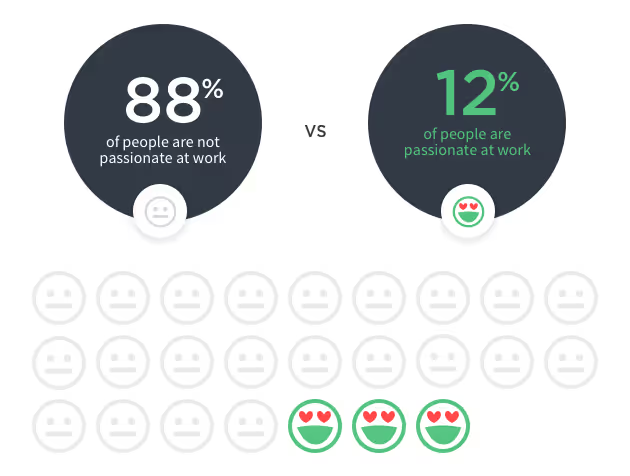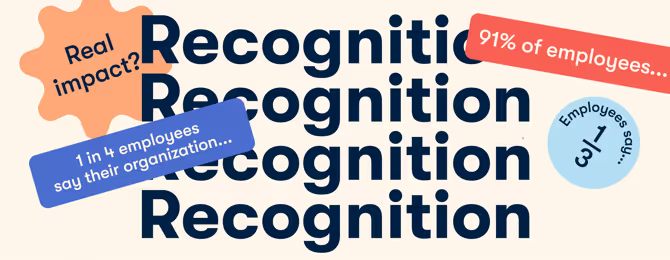Passion at work: How to be the inspiring spark your team needs

Discover Workleap Officevibe's benchmark report on 12 key employee engagement metrics

There is a really big problem in today’s workforce.
Almost no one is passionate about what they do.
In 2014, Deloitte released a comprehensive report that found 88% of employees don’t have passion for their work, and so they don’t contribute their full potential.

Even worse, they found that 80% of senior managers aren’t passionate about their work. We all know the value of leadership, and how engagement starts at the top, so think about how broken most cultures are.
How can we expect employees to give 100% of their effort and energy to go above and beyond when most of the leadership team isn’t passionate?
In addition, according to Officevibe's data, 3% of employees feel like their eight hours at work serves no purpose.
In this article, we explain the importance of inspiring passion at work and show you how you can ignite passion on your team.
What is a passionate worker?
Before we look at why employees aren’t passionate and how you can help them build that passion, it’s important to understand what a “passionate” worker is. Deloitte’s report explains it very well.
{emphasize}"Passionate workers are committed to continually achieving higher levels of performance. In today’s rapidly changing business environment, companies need positive energy because such workers can drive extreme and sustained performance improvement—more than the one-time performance “bump” that follows a bonus or the implementation of a worker engagement initiative.
These workers have both personal resilience and an orientation toward learning and improvement that helps organizations develop the resilience needed to withstand and grow stronger from continuous market challenges and disruptions."{emphasize}
Examples of performance goals for employees.
This is such a powerful explanation, let’s break it down further.
So many companies make the mistake of trying to incentivize work with a quick bonus or perk, but you’ll only get short term results. The secret to long term, true passion and consistent success for business is to create a workplace that allows workers to find passion by showing their positive impact on business results.
Here are signs that an employee has inspiring passion at work:
Proactivity and positive energy
Bringing new ideas to you or the team is a sign that an employee is thinking a few steps ahead. A passionate employee will always look for creative ways to solve problems because this is an occasion for him to learn.
Trying to improve in their area of expertise.
An employee who wants to follow a new formation or attend a seminar shows interest in his area of expertise and an interest in personal growth. This behaviour is an indicator of passion.
Helping other team members to find their passion.
When you found your own passion here, it's only natural that you want to help other find theirs. A passionate employee will go the extra mile to help his colleagues to be passionate.
You can witness this in interactions between your team members or in the feedback that employees give each other.
When you’re trying to reach new heights for your team, you need everyone to be able to handle stress well and have a growth mindset where you’re always learning and growing.
Why is passion important?
Passion is more long-term than engagement.
Employee engagement is usually thought of as happiness. Happiness with your work environment, your coworkers, and your boss balanced with your personal life.
Unfortunately, engagement often doesn't get the kind of results we want. Engagement is usually a small, short-term bump in performance. Employees that are unhappy become a bit happier, you’ll potentially lower your turnover rate and might have a more fun work environment.
Passion is much deeper than that.
When an employee is passionate about what they do, they consistently look for better ways to improve themselves, their role, and the business in general.
There’s a much bigger focus on growth and development.
Rather than bumps and dips (with engagement), you get a consistent, steady growth.

Why some employees lacking passion?
The problem, according to Deloitte’s report, is that companies aren’t creating the type of environments where passionate workers can thrive.
Even if you have a powerful mission and your employees want to grow, many companies are hindering that creativity, eve if they don’t realize it.
From their report:
Companies are missing out on a huge opportunity by being too risk averse.
These mistakes are rooted in fear, but companies need to be much more trusting of their employees if they expect to achieve great things.
Most employees want to get passionate about their work, they want to master their job, it’s an intrinsic career motivation for all of us to continuously develop.
For many different reasons (politics, processes and policies, etc.) employees get turned off and lose that passion.
How to develop passion on your team?
So then the question becomes, how do you create more passionate workers? How do we nurture our current talent and make them more passionate?
Don't forget! Passion can be developed. If an employee isn't feeling passionate at a certain point, it doesn't mean you should give up. As a manager, there are many ways to develop passion on your team.
Connecting
Workers that are passionate about what job they do are always looking to connect with others to help them improve and solve problems.
Deloitte recommends that you make efforts to help employees connect with other people at their company, and network with people outside of their workplace.
Questing
Workers with the questing attribute will always be looking for innovative ways to improve what they do. They’re constantly testing and experimenting with new ideas.
Deloitte encourages you to allow employees to work on side projects, or even better, let them choose which projects they work on at work.
Commitment To Domain
Passion workers have a commitment to the domain they’re in, and are deeply committed to the work they do.
A simple example of this is when a falsely accused criminal becomes a lawyer that fights wrongful convictions.
That experience leads them to be more deeply passionate about their work than someone who hasn’t had that experience.
Deloitte says that if you promote your purpose and allow employees to hear directly from customers, that can increase their commitment to domain.
Here are some of our tips (not from Deloitte’s report) to help your employees develop passion.
Find common goals
Bringing your team around a common goal is a great way to ignite passion in your employees.
With team goals, employees feel like they are part of something greater than their role and it's this can act as a motivating factor. This will connect each employee to support the greater mission of the company.
Develop A Growth Mindset
This is an important tip for both employees and the organization as a whole.
In order to have that experimental, exploratory mindset, you need to remove the fear from employees and get everyone in the company comfortable with failure and testing.
Help your employees to step out of their comfort zone
As mentioned above, passionate employees love to find creative solutions to regular problems in their expertise area.
A great way to stimulate your team members to be more passionate is to give them creative constraints that stimulate them to step out of their comfort zone and push them to be more forward-thinking!
Stay connected
If you're wondering if your employees are passionate about their work, why not ask? If your team is built on honesty and transparency, your employees won't be afraid to mention if they are feeling passionate about the work they do.
If you're worried that your employees might give positive answers to satisfy you, don't be afraid to use anonymous surveys. These are a great way to know what's really going on on your team. Officevibe's employee engagement software offer many questions about passion at work that you can ask to feel the pulse of your employees.
Give Employees Autonomy
It’s hard for someone to get passionate if they don’t have the autonomy to grow as a person.
If someone’s micromanaging, and controlling every move they make, there’s no way they’ll be able to develop passion and feel that excitement for what they’re doing.
Help Them Learn
You need to actively encourage them to learn and help them by giving them the resources they need to learn more.
Set up a budget so they can buy books, courses, and anything that will help them grow. Invest in your employees.
Send employees to conferences if it will help inspire them to learn and connect with others.
Make time for them to learn. Don’t set unrealistic deadlines for them and encourage them to take time to learn. It will benefit you in the long run.
Myths about passion
Deloitte’s report also gave a few common myths that exist about passion for work.
The key thing you need to understand is that everyone has the potential to be passionate about work. Humans are intrinsically motivated to master skills, grow, and get excited about what task they’re working on.
Only Younger Workers Are Passionate
One myth that they found exists in among many people is that only younger workers could get passionate about what they do.
This is a pretty dangerous myth to have because what companies might do to solve this is focus on hiring younger workers, thinking they’re more passionate than older workers.
Companies might also be overlooking older workers that have the passion they’re looking for.
Their data found that there was no significant difference in any age group they looked at.
Younger workers were passionate, but sometimes passion comes with experience.
Age has nothing to do with keeping the passion alive. It’s really all about creating the right type of environment for passion to exist.
Small Companies Have More Passionate Employees
Everyone has a vision of a fast-paced, young, cool startup company versus a stodgy, old, corporate company with tons of red-tape holding moving incredibly slowly.
But this is just a myth. It’s a false perception.
It’s more about a company’s values, policies, and culture. Their research found that large companies were just as good (or bad) at developing passion.
Again, what’s most important is how easy it is for employees to learn, develop, and grow.
More Educated Workers Are More Passionate
Another myth that exists is that the more educated you are, the more passionate you are.
While I can understand why this myth might exist, it’s simply not true.
Again, everyone (regardless of education) has the desire and ability to develop that passion. The most important part of building passion is the type of environment they’re in.
Getting a university degree has nothing to do with how much you believe in something.
Only Knowledge Workers Are Passionate
This one is half-true. The workers at the top reported higher passion (around 20%), whereas front-line workers reported around 6%, but again, anyone can be passionate.
The reason for front-line workers being less passionate is likely because they’re given the least amount of autonomy, they’re the most micromanaged and have the most restraints put on their creativity.
So while it’s true that as you move up the corporate ladder, you have more chance of being passionate, it’s more about the type of environment that front-line workers experience.
Give HR and managers the clarity, confidence, and connection to lead better every day.


.avif)









